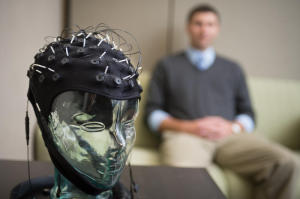Sometimes, kids just need drugs.

Yep. There are some disorders for which there are few workable alternatives and, as a last resort, medication is the only viable solution; but if your kid was diagnosed with ADHD, wouldn’t you want to at least try out potential “second options” for him or her before initiating Operation Pill Pop prematurely? Matthew Pontifex, a Michigan State University professor, seems to agree. In fact, he may have potentially figured it all out. How? Well, in a short answer: Exercise.
That’s right. MSU researchers took to the lab, designed the most obvious experiment in the world, and managed to get into the Journal of Pediatrics with it. Here are the highly complicated parameters of the experiment. Despite its tough jargon and complexity, try not to…you know… “get distracted”:
Step 1. Take 40 kids (aged between 8 and 10) and plop them on a treadmill for 20 minutes.
Step 2. Give them objective math & reading tests and a “distraction” test.
Step 3. Jot down the findings on their clipboard.
Step 4. Profit
I certainly hope I didn’t lose you. That must have been a challenge and a half to concoct. The only thing worth more of a facepalm than the fact no one else thought to do this previously, are the findings. Now for your test! You get to guess the answer to the following question: how many of the kids did better post-cardio… and on which of the tests?

Stumped?
I’ll give you a hint: all of them. All 40 children did better on every one of the tests. On math and reading, scores simply were higher. On the test for “inhibitory control” – aka the distraction test itself though, kids did something unique; they slowed down to study their mistakes, so that they wouldn’t make them again. That last fact alone is a huge feat. Kids with this disorder have a real challenge doing that. It’s kind of why they get diagnosed with ADHD in the first place.
Even in my late 20’s, I still joke about being “attention deficit”. A lot of my cohort group does too – turning the slightest moment of mental relapse into early onset dementia or self-diagnosed attention deficit. Even during college, I often couldn’t focus on my studies until I had done a brisk cleaning of my room – or if my room was clean – made a quick trip to the gym.
All along, I thought I was just distracted by my “to do” list, or that I was putting off my work; but thanks to Pontifex and this seemingly sophomoric experiment, I realize I might have had the reasoning all wrong. Either way, we both got to the finish line the same way, right?

Okay, maybe the experimental tools are little more complex than suggested…
Anyway, perhaps we all share some proclivity for a “distraction disorder” at any age, and some just have it a little worse. What’s important here, though, is that you and I don’t really matter. Children, on the contrary, are still developing. That sounds obvious, but when you consider that their brains are in a critical phase of acquiring everything (including learning and behavioral habits) they’ll need later in life, the need to look somewhere other than your local pharmacy for answers is even more important.
The stats don’t lie, either. There was an age before social networking when hitting around a ball outside, taking a walk with mom, or jogging with dad really put things in perspective. We weren’t designed to sit around staring at a screen or wall all day long sans sunshine or activity. It’s prison by design – who wouldn’t develop a disorder?
Did I lose you there with my preachy crap?
Let’s think of it this way then – with a simple “Pro and Con” layout. We’ll start with the former. First, prescription drugs are on the rise – price wise; why pay if you don’t have to? Second, getting outside and running around is a good break from video games, Twitter, and Facebook anyway. Third, exercise also isn’t a bad habit to start early in our obesity-prone country. You know what is a bad habit to start early, though?
It can be found in the fourth fact: the only “con” there is when it comes to your child’s health, are the people trying to “con” you into teaching your kid the mentality that pills are the first place to look for answers, instead of the absolute last.
Not a sermon. Just some reason.
xoxo
<3~A